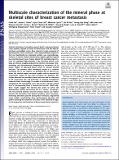Multiscale characterization of the mineral phase at skeletal sites of breast cancer metastasis
Author(s)
He, Frank; Chiou, Aaron E.; Loh, Hyun Chae; Lynch, Maureen; Seo, Bo Ri; Song, Young Hye; Lee, Min Joon; Hoerth, Rebecca; Bortel, Emely L.; Willie, Bettina M.; Duda, Georg N.; Estroff, Lara A.; Masic, Admir; Wagermaier, Wolfgang; Fratzl, Peter; Fischbach, Claudia; ... Show more Show less
Download10542.full.pdf (1.523Mb)
PUBLISHER_POLICY
Publisher Policy
Article is made available in accordance with the publisher's policy and may be subject to US copyright law. Please refer to the publisher's site for terms of use.
Terms of use
Metadata
Show full item recordAbstract
Skeletal metastases, the leading cause of death in advanced breast cancer patients, depend on tumor cell interactions with the mineralized bone extracellular matrix. Bone mineral is largely composed of hydroxyapatite (HA) nanocrystals with physicochemical properties that vary significantly by anatomical location, age, and pathology. However, it remains unclear whether bone regions typically targeted by metastatic breast cancer feature distinct HA materials properties. Here we combined high-resolution X-ray scattering analysis with large-area Raman imaging, backscattered electron microscopy, histopathology, and microcomputed tomography to characterize HA in mouse models of advanced breast cancer in relevant skeletal locations. The proximal tibial metaphysis served as a common metastatic site in our studies; we identified that in disease-free bones this skeletal region contained smaller and less-oriented HA nanocrystals relative to ones that constitute the diaphysis. We further observed that osteolytic bone metastasis led to a decrease in HA nanocrystal size and perfection in remnant metaphyseal trabecular bone. Interestingly, in a model of localized breast cancer, metaphyseal HA nanocrystals were also smaller and less perfect than in corresponding bone in disease-free controls. Collectively, these results suggest that skeletal sites prone to tumor cell dissemination contain less-mature HA (i.e., smaller, less-perfect, and less-oriented crystals) and that primary tumors can further increase HA immaturity even before secondary tumor formation, mimicking alterations present during tibial metastasis. Engineered tumor models recapitulating these spatiotemporal dynamics will permit assessing the functional relevance of the detected changes to the progression and treatment of breast cancer bone metastasis. Keywords: breast cancer; bone metastasis; bone mineral nanostructure; X-ray scattering; Raman imaging
Date issued
2017-08Department
Massachusetts Institute of Technology. Department of Civil and Environmental EngineeringJournal
Proceedings of the National Academy of Sciences
Publisher
National Academy of Sciences (U.S.)
Citation
He, Frank et al. “Multiscale Characterization of the Mineral Phase at Skeletal Sites of Breast Cancer Metastasis.” Proceedings of the National Academy of Sciences 114, 40 (September 2017): 10542–10547 © 2017 National Academy of Sciences
Version: Final published version
ISSN
0027-8424
1091-6490